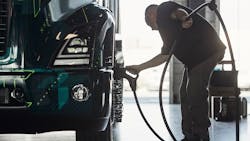California pushes fleets to phase out diesel by 2045
California wants to make diesel-powered trucks and vans extinct by the middle of the century. The state’s air pollution board will require fleets to buy more zero-emission vehicles over the next 25 years until diesel-powered trucks and buses are a thing of the past out West.
The California Air Resources Board (CARB) adopted the first-in-the-nation new clean-truck standard on June 25. The initial focus of the regulations is on larger fleets with vehicles suitable for early electrification, those fleets’ subhaulers, and the large companies that hire them. It will limit how many diesel-powered vehicles manufacturers can sell in the state starting in 2024. Those limitations will increase until 2045 when all new Class 2 to Class 8 vehicles sold in the Golden State must be zero-emission.
“For decades, while the automobile has grown cleaner and more efficient, the other half of our transportation system has barely moved the needle on clean air,” said CARB Chairwoman Mary D. Nichols, who praised the Advanced Clean Trucks regulations. “Diesel vehicles are the workhorses of the economy, and we need them to be part of the solution to persistent pockets of dirty air in some of our most disadvantaged communities. Now is the time — the technology is here and so is the need for investment.”
CARB estimates that 2 million diesel trucks cause 70% of smog-causing pollution in the state. When announcing its decision, CARB noted that many California neighborhoods — particularly those of minorities and low-income residents — are near ports, railyards, distributions centers and other freight corridors that see the most truck traffic. The new rule, the board noted, directly addresses the pollution affecting these communities.
The Diesel Technology Forum (DTF) responded to the new rules by declaring that diesel-powered commercial vehicles will be an essential part of California and the nation’s economy for decades.
“Diesel is the technology of choice for America’s trucking industry because of its unique combination of features: the most energy-efficient internal combustion engine, power density, driving range, reliability, durability and widely available fueling, servicing and parts networks,” noted Allen Schaeffer, DTF’s executive director. “Continuous improvement that has now achieved near-zero emissions, improving energy efficiency and capabilities of using low-carbon renewable biodiesel fuels, ensure diesel’s place in the future.”
Schaeffer added that diesel technology has seen drastic reductions in emissions of particulate matter and nitrogen oxide. “Today, diesel engines using renewable diesel fuel and blends of biodiesel fuels in California are delivering more greenhouse gas benefits than all electric vehicles combined,” Schaeffer said. “The replacement of older trucks in California with more efficient new diesel models coupled with the use of these biofuels represents a low-cost solution to deliver substantial and immediate greenhouse gas reductions compared to other approaches.”
CARB wants those older trucks replaced with new non-diesel trucks. The CARB rules approved in late June for medium- and heavy-duty trucks and vans puts California on the path to zero-emission short-haul drayage fleets in ports and railyards by 2035, followed by zero-emissions last-mile delivery by 2040. By 2045 any vehicle larger than a Class 1 pickup truck sold in California must run completely on alternative fuels.
The new rules start in 2024 when 3% of Class 2 and Class 3, 7% of Class 4 through Class 8 trucks, and 3% of Class 7 and 8 tractors purchased in California must be emission-free. By 2030, half of Classes 4-6 and 30% of Classes 7 and 8 sales must be ZEVs. The share of zero-emission purchases is supposed to continue to grow until it includes all new vehicles by 2045.
This requirement to shift to zero-emission trucks — along with CARB’s push to encourage more zero-emission passenger cars and rules to electrify regional transit buses by 2030 — would help California meet its climate goals and federal air quality standards, according to CARB. The climate agency noted that the Los Angeles region and the San Joaquin Valley areas have the highest air pollution levels in the nation. The new regulations would lower related premature deaths by 1,000, according to the state.
The Advanced Clean Truck Fleets rule phases in available heavy-duty zero-emission technology starting in 2024 with full transformation over the next two decades. CARB is looking to signal manufacturers, fleet owners and utilities to not delay investments in zero-emission trucks. It builds on California’s leadership as a manufacturer of zero-emission transportation.
CARB plans to consider two complementary regulations this year: One would create new limits NOx (nitrogen oxide) for trucks still running on diesel. The other would require larger fleets to transition to more electric-powered trucks each year.
About the Author
Josh Fisher
Editor-in-Chief
Editor-in-Chief Josh Fisher has been with FleetOwner since 2017. He covers everything from modern fleet management to operational efficiency, artificial intelligence, autonomous trucking, alternative fuels and powertrains, regulations, and emerging transportation technology. Based in Maryland, he writes the Lane Shift Ahead column about the changing North American transportation landscape.

